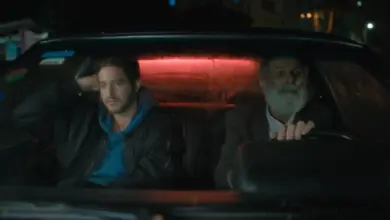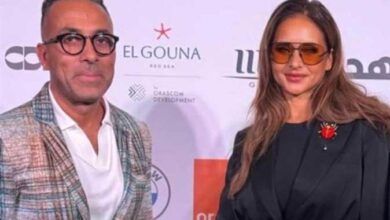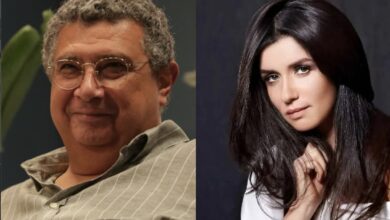Rising Egyptian actor Mohamed Karim was born to a whole family of medics, so it seemed inevitable he would inherit a love for the sacred profession. In his teen years, however, Karim found himself attracted to the glamour of the silver screen, and within a decade, he scored success in Egyptian television and cinema, as well as at the Cannes Film Festival and in Hollywood studios.
Karim is best known for starring in director Khaled Youssef’s 2009 film “Dokkan Shehata” (Shehata’s Shop) along with Amr Saad and Haifa Wahby, but his career started long before that.
Born and raised in Cairo, Karim travelled to Los Angeles at the age of 18 to complete his high school education. That year he only discovered America through classroom windows, as he was keen to score high grades that would pave his way into medical school – and he did.
“I finished third in my class,” Karim remembers.
Eventually, he returned to Cairo to study medicine at Ain Shams University, but he would travel to LA during summer vacations to follow American cinema in a city he still misses. By his third year at university, Karim had started his journey into the entertainment business.
“I started from below scratch,” laughs Karim, whose first appearances were in TV commercials.
“The first ad I did was alongside renowned football player Mahmoud al-Khatib, but you can barely spot me on the screen. I was one of the extras running after him in a car, but my face was cut outside the shooting frame!”
Bit by bit, more ads came his way and Karim’s face became familiar to the audience.
“I was the star of street kiosks because my ads posters were floating all around the city. The posters showed me either eating chips or driving a Hyundai… But the best one was as an ad for Molto that was aired every couple of minutes during the 1998 FIFA World Cup,” he says.
TV commercials taught Karim how to “steal the show”, as they say in the film and TV business.
“You either get the cameraman’s attention or someone else will,” he explains.
Karim decided to join a modeling school in Cairo while completing his undergraduate studies. He appeared in fashion shows alongside popular actors Khaled Abouelnaga and Ahmed Ezz, who were still modeling at the time. This landed him a role as a presenter for a children's show on national TV.
“I became known as Uncle Mohamed,” Karim says playfully.
He was so popular with children that he couldn’t walk down the street without being chased by his young fans.
But moving into acting wasn’t that easy. In his last years at medical school, Karim repeatedly approached producers of Ramadan TV series.
“I used to take my headshots and drop by the studios, hoping to get their attention. But unfortunately, most of my efforts were in vain and I was about to lose all hope.”
It was Karim’s father who encouraged him to follow his dream, even if it meant not practicing medicine.
“After graduation, I used to return extremely tired from my night shifts, only to find my father flipping through newspapers and recommending auditions for me,” Karim remembers fondly.
Finally, his first breakthrough came in Ramadan 2002, when he got a role in “Al-Attar wal Sabaa’ Banat” (The Spice Dealer and the Seven Girls) TV series. The following year the local film industry was slow, driving many filmmakers to turn to television. Film directors cast Karim in three Ramadan TV series: Khairi Beshara’s “Masalet Mabadaa” (A Matter of Principle), Mohamed Abu Saif's “Bent Afandina” (The Afandi’s Daughter), and Magdi Ahmed Ali’s “Fresca”. The works were well received and Karim was hosted by a number of TV shows as an actor for the first time.
“It was a good sign that I would make it to celluloid soon,” says Karim.
Karim succeeded in changing TV casting norms by starring in two consecutive series, despite being new to the acting scene.
“Both ‘Bent Afandina’ and ‘Fresca’ established my status in the Ramadan TV season, which is generally dominated by big names we keep seeing every year,” he explains.
His role in “Bent Afandina” as a young rebel in the 1952 revolution garnered him the best actor award in a state TV poll on Ramadan series. That role also paved the way for his first role in cinema. Producer Hesham Abdel-Khalek of Al-Massa Art Production Company cast him alongside Ahmed Rizk and Sherif Mounir in “Al-Torbini”, an Egyptian adaptation of Barry Levinson’s “Rain Man”.
Karim then accepted two small roles in Khaled Youssef’s “Heina Mayssara” (In Good Time) and “Al-Rayes Omar Harb” (Leader Omar Harb) before co-starring in “Dokkan Shehata” as a villain who envies his brother Shehata, steals his loved one and throws him in jail.
“This villainous role was quite challenging after many acting roles as jeune premier on TV,” says Karim.
“Dokkan Shehata” was shown in several festivals around the Arab world and Europe, and at the Cannes Film Market in 2009.
“I discovered that I was popular in countries like the UAE and Algeria, which encouraged me to seek opportunities abroad as well.”
During his travels to the US, Karim took an intensive acting course and was introduced to various Arab-American filmmakers, such as the late Mostafa Akkad, who produced the “Halloween” horror series to raise money for Arab- and Islamic-themed films like “Omar Al-Mokhatar” and “Al-Ressala”.
“I learned from Akkad that acting is a cumulative experience. He advised me to also study filmmaking to become a producer or director later in my career,” says Karim. “I am starting to raise funds for a script I intend to produce.”
Karim landed his first American role in the 2010 feature film “Freedom”, in which he was cast as a young man born in a Muslim country who moves to the US after witnessing the death of his parents.
“I like the script because it doesn’t portray Muslims in the stereotypical way common in American cinema. It’s about a young Muslim man, trying to keep his identity while leading a peaceful life in the US,” he explains.
Karim is now back in Cairo, experimenting with different roles. He has just finished a short film titled “Tahrir Square”, in which he plays one of the victims of the 25 January uprising, shot by snipers. He is also working on a TV serial for Ramadan 2011 and two new British films: “Blooded” and “Tarot”.



